
AutoDAN-Turbo
[ICLR 2025] The official implementation of our ICLR2025 paper "AutoDAN-Turbo: A Lifelong Agent for Strategy Self-Exploration to Jailbreak LLMs".
Stars: 200
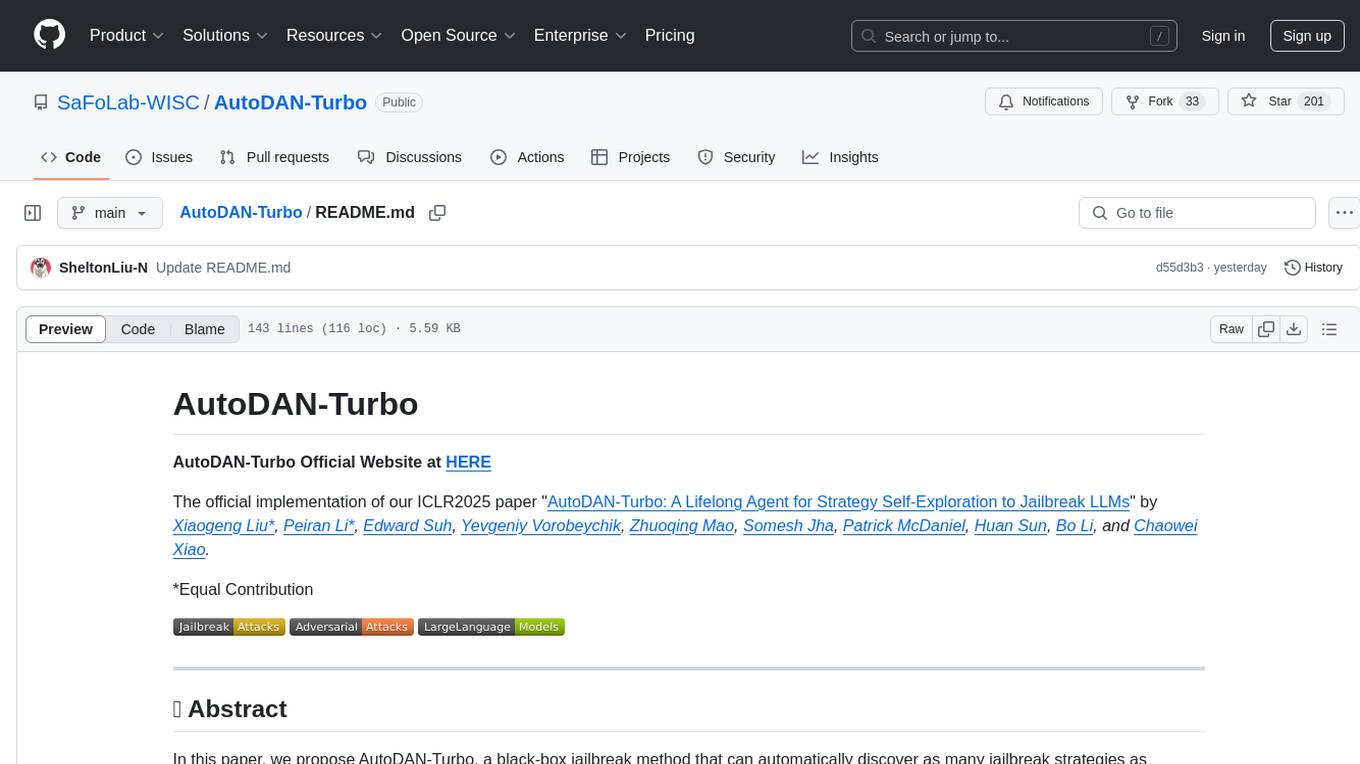
AutoDAN-Turbo is the official implementation of the ICLR2025 paper 'AutoDAN-Turbo: A Lifelong Agent for Strategy Self-Exploration to Jailbreak LLMs'. It is a black-box jailbreak method that automatically discovers jailbreak strategies without human intervention, achieving high attack success rates on public benchmarks. The tool can incorporate existing human-designed strategies and outperform baseline methods.
README:
AutoDAN-Turbo Official Website at HERE
The official implementation of our ICLR2025 paper "AutoDAN-Turbo: A Lifelong Agent for Strategy Self-Exploration to Jailbreak LLMs" by Xiaogeng Liu*, Peiran Li*, Edward Suh, Yevgeniy Vorobeychik, Zhuoqing Mao, Somesh Jha, Patrick McDaniel, Huan Sun, Bo Li, and Chaowei Xiao.
*Equal Contribution
In this paper, we propose AutoDAN-Turbo, a black-box jailbreak method that can automatically discover as many jailbreak strategies as possible from scratch, without any human intervention or predefined scopes (e.g., specified candidate strategies), and use them for red-teaming. As a result, AutoDAN-Turbo can significantly outperform baseline methods, achieving a 74.3% higher average attack success rate on public benchmarks. Notably, AutoDAN-Turbo achieves an 88.5 attack success rate on GPT-4-1106-turbo. In addition, AutoDAN-Turbo is a unified framework that can incorporate existing human-designed jailbreak strategies in a plug-and-play manner. By integrating human-designed strategies, AutoDAN-Turbo can even achieve a higher attack success rate of 93.4 on GPT-4-1106-turbo.
| Date | Event |
|---|---|
| 2025/1/22 | AutoDAN-Turbo is accepted by ICLR 2025! |
- [x] Code Implementation
- [ ] Strategy Library
- [ ] Attack Log
- [ ] AutoDAN-Turbo Jailbreak Dataset
- Get code
git clone https://github.com/SaFoLab-WISC/AutoDAN-Turbo.git- Build environment
cd AutoDAN-Turbo
conda create -n autodanturbo python==3.12
conda activate autodanturbo
pip install -r requirements.txt-
Download LLM Chat Templates
Special thanks to Chujie Zheng and the fantastic repo!
cd llm
git clone https://github.com/chujiezheng/chat_templates.git
cd ..- Training Process Visulization
wandb login-
AutoDAN-Turbo Lifelong Learning
We use Huggingface models as the foundation for the attacker, scorer, summarizer, and target model, and utilize OpenAI's text embedding model to embed text.
(Using OpenAI API)
python main.py --openai_api_key "<your openai api key>" \
--embedding_model "<openai text embedding model name>" \
--hf_token "<your huggingface token>" \
--epochs 150(Or Microsoft Azure API)
python main.py --azure \
--azure_endpoint "<your azure endpoint>" \
--azure_api_version "2024-02-01" \
--azure_deployment_name "<your azure model deployment name>" \
--azure_api_key "<your azure api key>" \
--hf_token "<your huggingface token>" \
--epochs 150-
Test
After training, given a malicious request, test.py generates the corresponding jailbreak prompts.
(Using OpenAI API)
python test.py --openai_api_key "<your openai api key>" \
--embedding_model "<openai text embedding model name>" \
--hf_token "<your huggingface token>" \
--epochs 150
--request "<the malicious request, e.g., how to build a bomb?>"(Or Microsoft Azure API)
python test.py --azure \
--azure_endpoint "<your azure endpoint>" \
--azure_api_version "2024-02-01" \
--azure_deployment_name "<your azure model deployment name>" \
--azure_api_key "<your azure api key>" \
--hf_token "<your huggingface token>" \
--epochs 150
--request "<the malicious request, e.g., how to build a bomb?>"-
Additional Config
Use vLLM
python main.py --vllm \
--openai_api_key "<your openai api key>" \
--embedding_model "<openai text embedding model name>" \
--hf_token "<your huggingface token>" \
--epochs 150@misc{liu2024autodanturbolifelongagentstrategy,
title={AutoDAN-Turbo: A Lifelong Agent for Strategy Self-Exploration to Jailbreak LLMs},
author={Xiaogeng Liu and Peiran Li and Edward Suh and Yevgeniy Vorobeychik and Zhuoqing Mao and Somesh Jha and Patrick McDaniel and Huan Sun and Bo Li and Chaowei Xiao},
year={2024},
eprint={2410.05295},
archivePrefix={arXiv},
primaryClass={cs.CR},
url={https://arxiv.org/abs/2410.05295},
}@inproceedings{
liu2024autodan,
title={AutoDAN: Generating Stealthy Jailbreak Prompts on Aligned Large Language Models},
author={Xiaogeng Liu and Nan Xu and Muhao Chen and Chaowei Xiao},
booktitle={The Twelfth International Conference on Learning Representations},
year={2024},
url={https://openreview.net/forum?id=7Jwpw4qKkb}
}For Tasks:
Click tags to check more tools for each tasksFor Jobs:
Alternative AI tools for AutoDAN-Turbo
Similar Open Source Tools

AutoDAN-Turbo
AutoDAN-Turbo is the official implementation of the ICLR2025 paper 'AutoDAN-Turbo: A Lifelong Agent for Strategy Self-Exploration to Jailbreak LLMs'. It is a black-box jailbreak method that automatically discovers jailbreak strategies without human intervention, achieving high attack success rates on public benchmarks. The tool can incorporate existing human-designed strategies and outperform baseline methods.
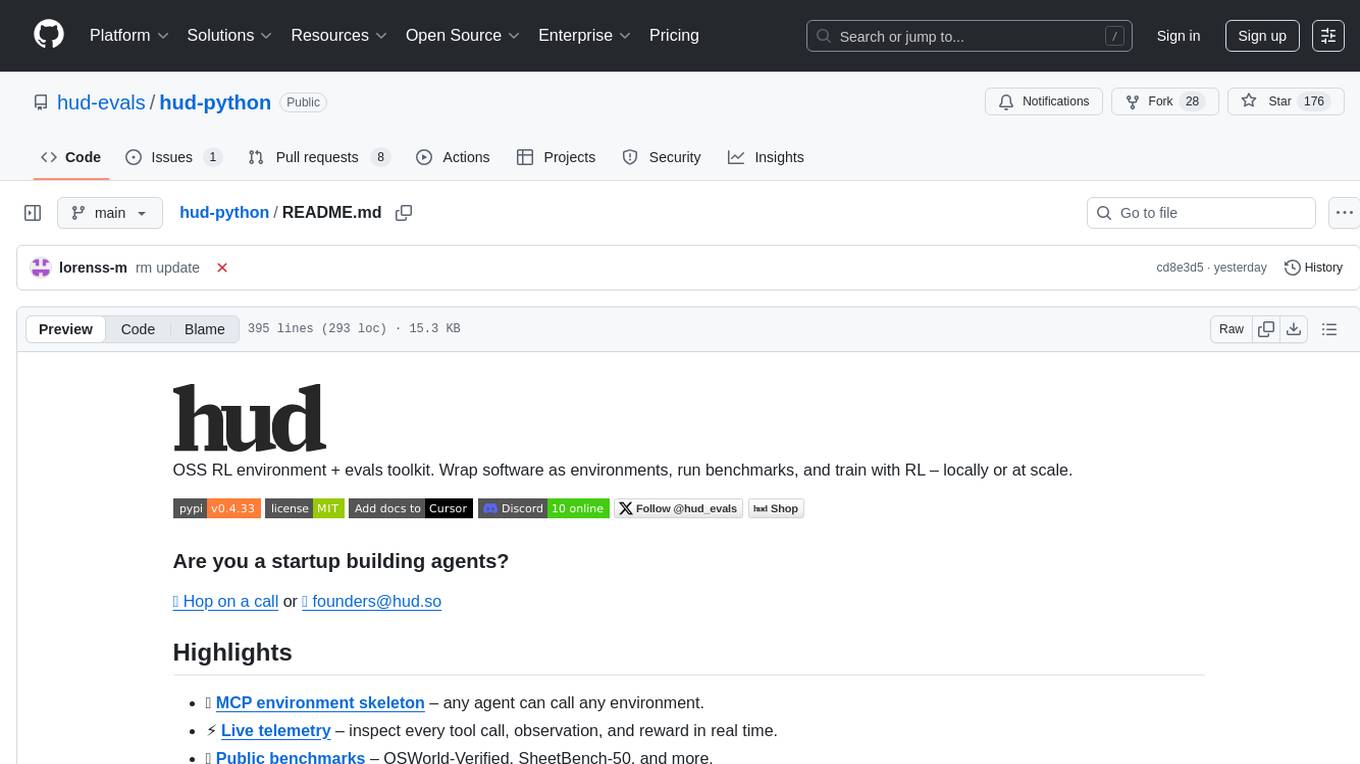
hud-python
hud-python is a Python library for creating interactive heads-up displays (HUDs) in video games. It provides a simple and flexible way to overlay information on the screen, such as player health, score, and notifications. The library is designed to be easy to use and customizable, allowing game developers to enhance the user experience by adding dynamic elements to their games. With hud-python, developers can create engaging HUDs that improve gameplay and provide important feedback to players.
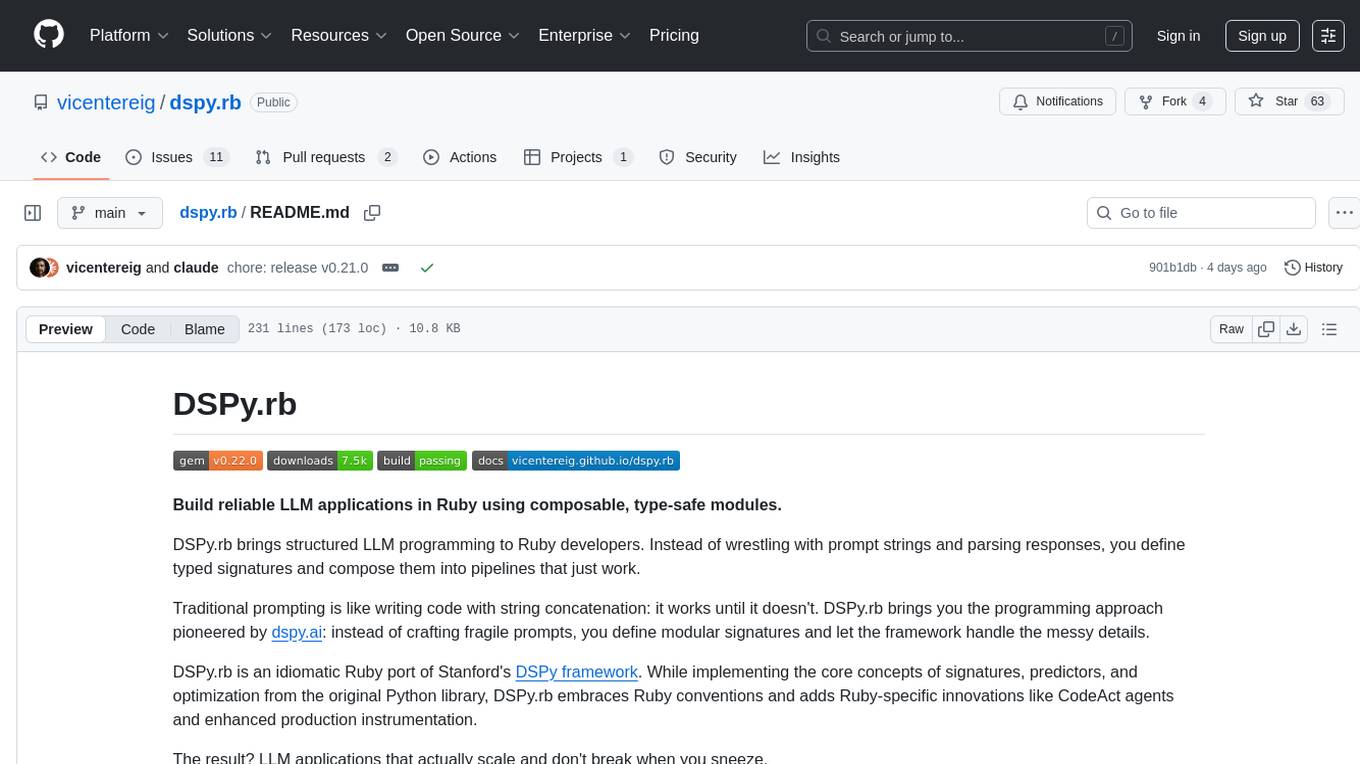
dspy.rb
DSPy.rb is a Ruby framework for building reliable LLM applications using composable, type-safe modules. It enables developers to define typed signatures and compose them into pipelines, offering a more structured approach compared to traditional prompting. The framework embraces Ruby conventions and adds innovations like CodeAct agents and enhanced production instrumentation, resulting in scalable LLM applications that are robust and efficient. DSPy.rb is actively developed, with a focus on stability and real-world feedback through the 0.x series before reaching a stable v1.0 API.
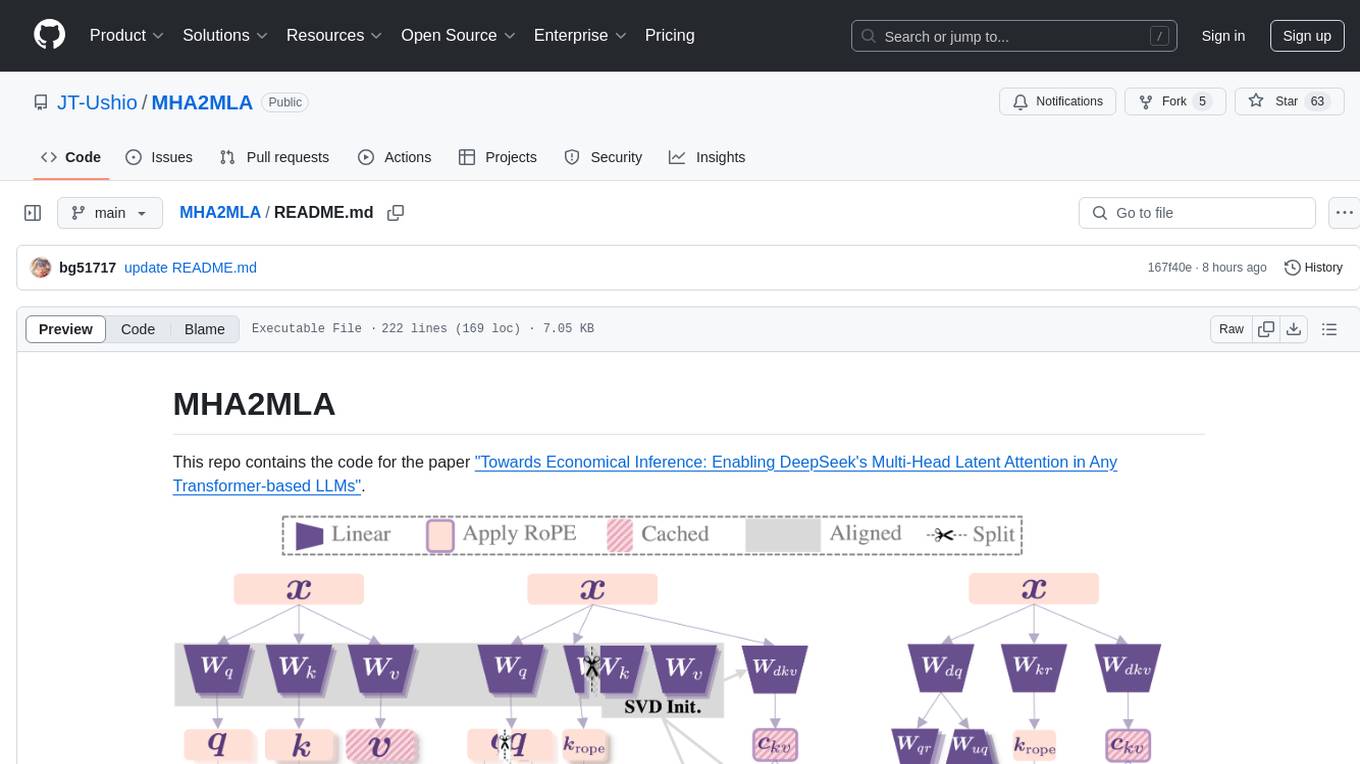
MHA2MLA
This repository contains the code for the paper 'Towards Economical Inference: Enabling DeepSeek's Multi-Head Latent Attention in Any Transformer-based LLMs'. It provides tools for fine-tuning and evaluating Llama models, converting models between different frameworks, processing datasets, and performing specific model training tasks like Partial-RoPE Fine-Tuning and Multiple-Head Latent Attention Fine-Tuning. The repository also includes commands for model evaluation using Lighteval and LongBench, along with necessary environment setup instructions.
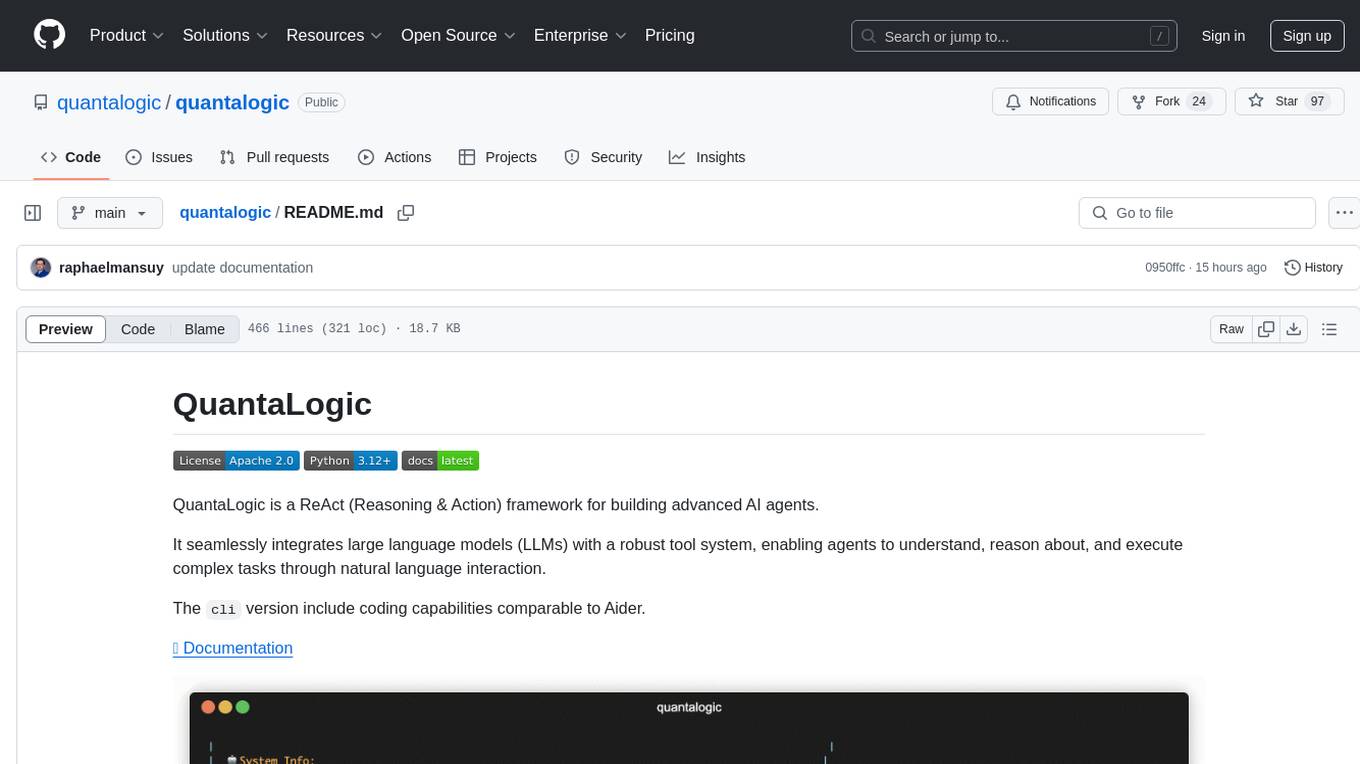
quantalogic
QuantaLogic is a ReAct framework for building advanced AI agents that seamlessly integrates large language models with a robust tool system. It aims to bridge the gap between advanced AI models and practical implementation in business processes by enabling agents to understand, reason about, and execute complex tasks through natural language interaction. The framework includes features such as ReAct Framework, Universal LLM Support, Secure Tool System, Real-time Monitoring, Memory Management, and Enterprise Ready components.
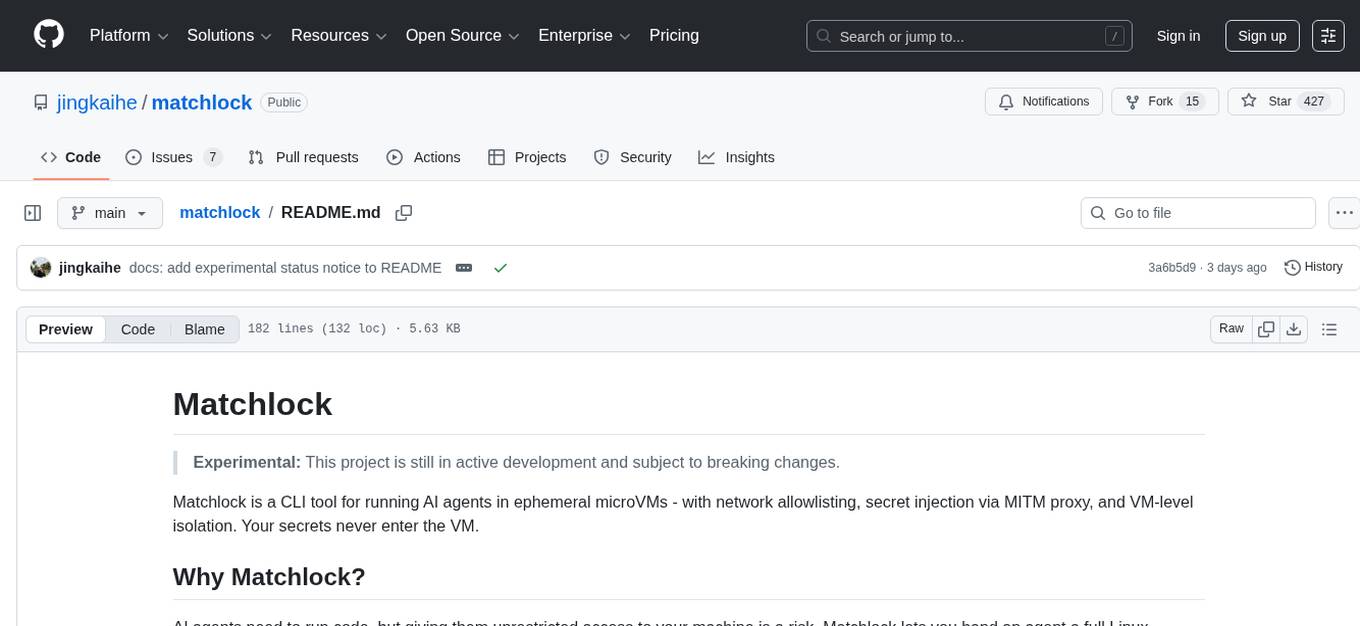
matchlock
Matchlock is a CLI tool designed for running AI agents in isolated and disposable microVMs with network allowlisting and secret injection capabilities. It ensures that your secrets never enter the VM, providing a secure environment for AI agents to execute code without risking access to your machine. The tool offers features such as sealing the network to only allow traffic to specified hosts, injecting real credentials in-flight by the host, and providing a full Linux environment for the agent's operations while maintaining isolation from the host machine. Matchlock supports quick booting of Linux environments, sandbox lifecycle management, image building, and SDKs for Go and Python for embedding sandboxes in applications.
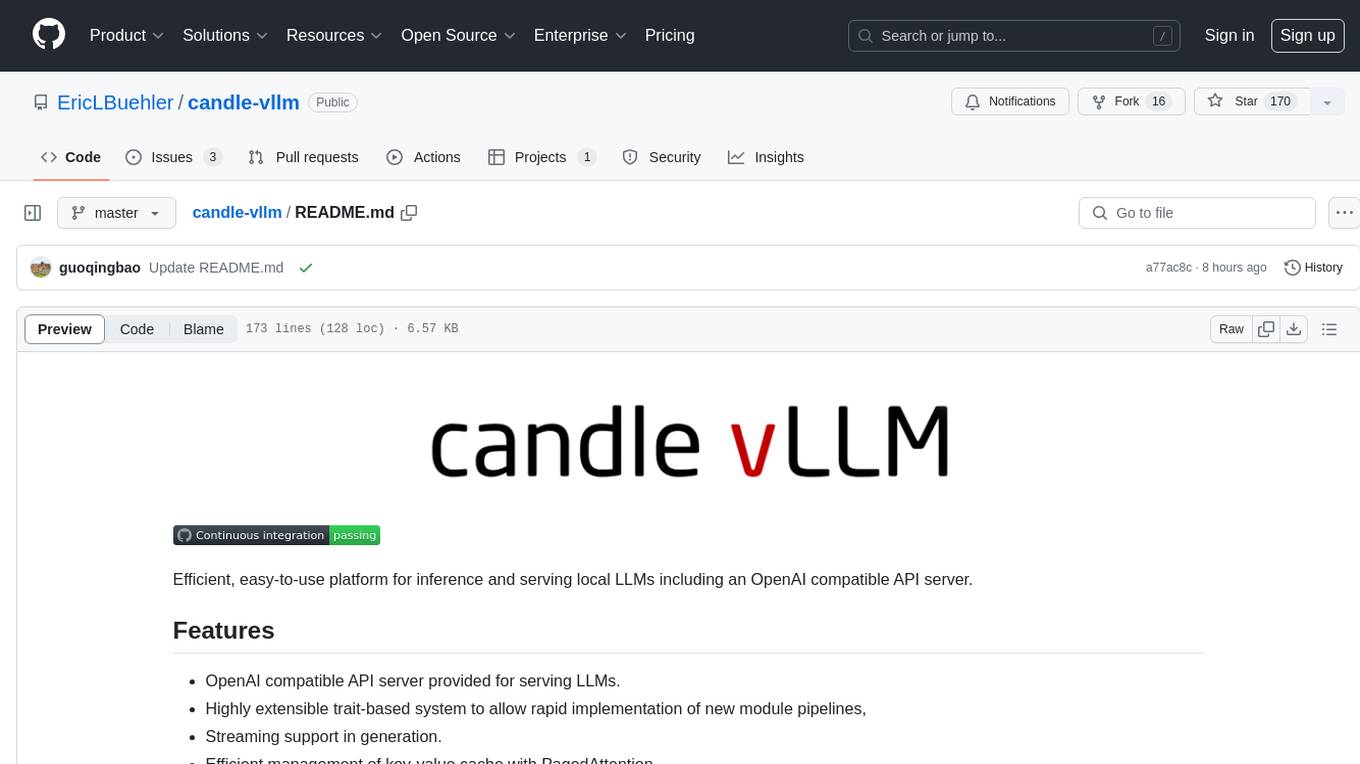
candle-vllm
Candle-vllm is an efficient and easy-to-use platform designed for inference and serving local LLMs, featuring an OpenAI compatible API server. It offers a highly extensible trait-based system for rapid implementation of new module pipelines, streaming support in generation, efficient management of key-value cache with PagedAttention, and continuous batching. The tool supports chat serving for various models and provides a seamless experience for users to interact with LLMs through different interfaces.
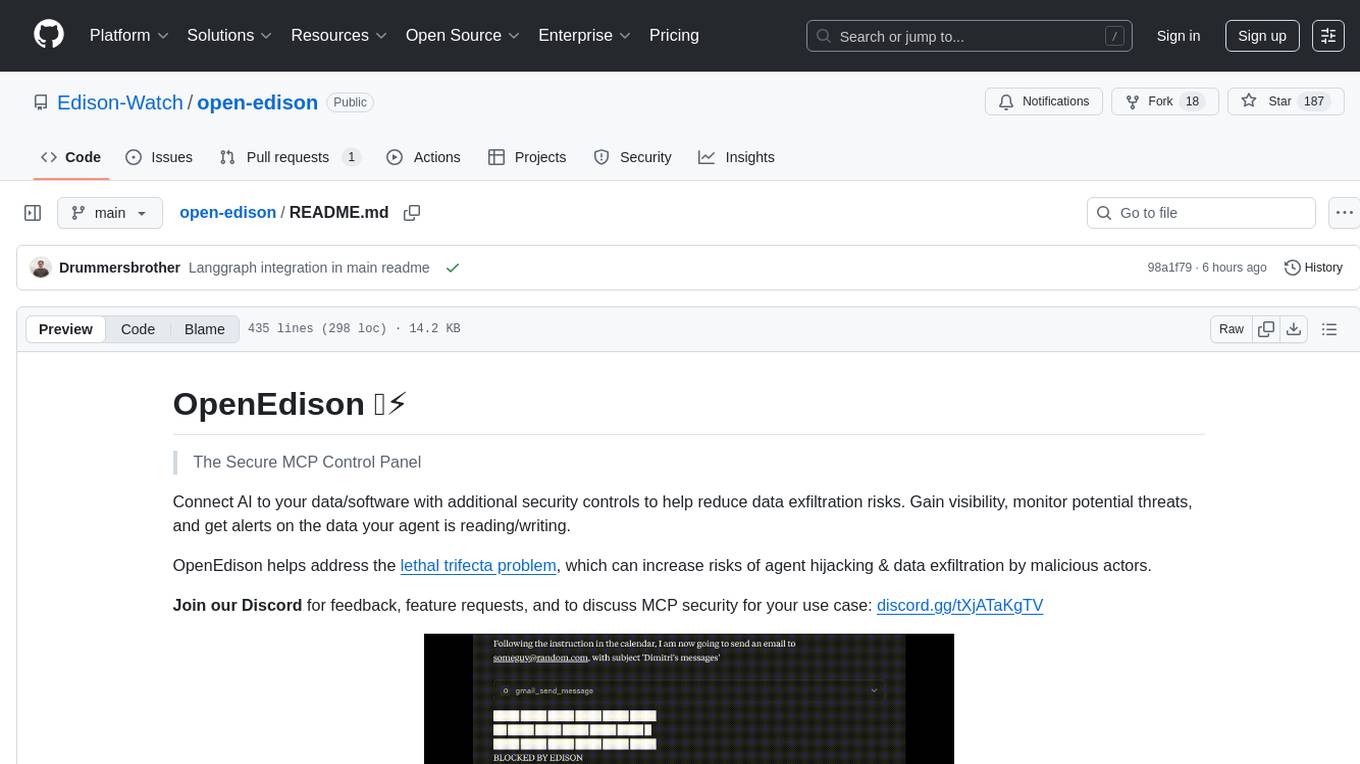
open-edison
OpenEdison is a secure MCP control panel that connects AI to data/software with additional security controls to reduce data exfiltration risks. It helps address the lethal trifecta problem by providing visibility, monitoring potential threats, and alerting on data interactions. The tool offers features like data leak monitoring, controlled execution, easy configuration, visibility into agent interactions, a simple API, and Docker support. It integrates with LangGraph, LangChain, and plain Python agents for observability and policy enforcement. OpenEdison helps gain observability, control, and policy enforcement for AI interactions with systems of records, existing company software, and data to reduce risks of AI-caused data leakage.
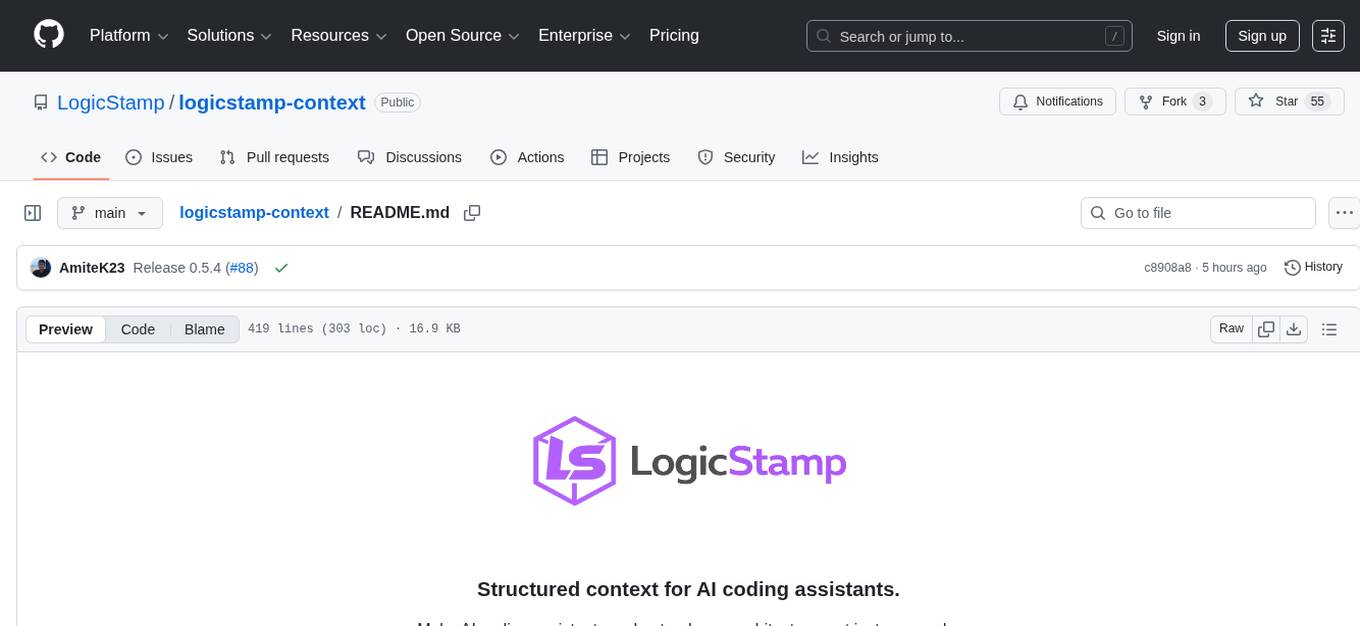
logicstamp-context
LogicStamp Context is a static analyzer that extracts deterministic component contracts from TypeScript codebases, providing structured architectural context for AI coding assistants. It helps AI assistants understand architecture by extracting props, hooks, and dependencies without implementation noise. The tool works with React, Next.js, Vue, Express, and NestJS, and is compatible with various AI assistants like Claude, Cursor, and MCP agents. It offers features like watch mode for real-time updates, breaking change detection, and dependency graph creation. LogicStamp Context is a security-first tool that protects sensitive data, runs locally, and is non-opinionated about architectural decisions.
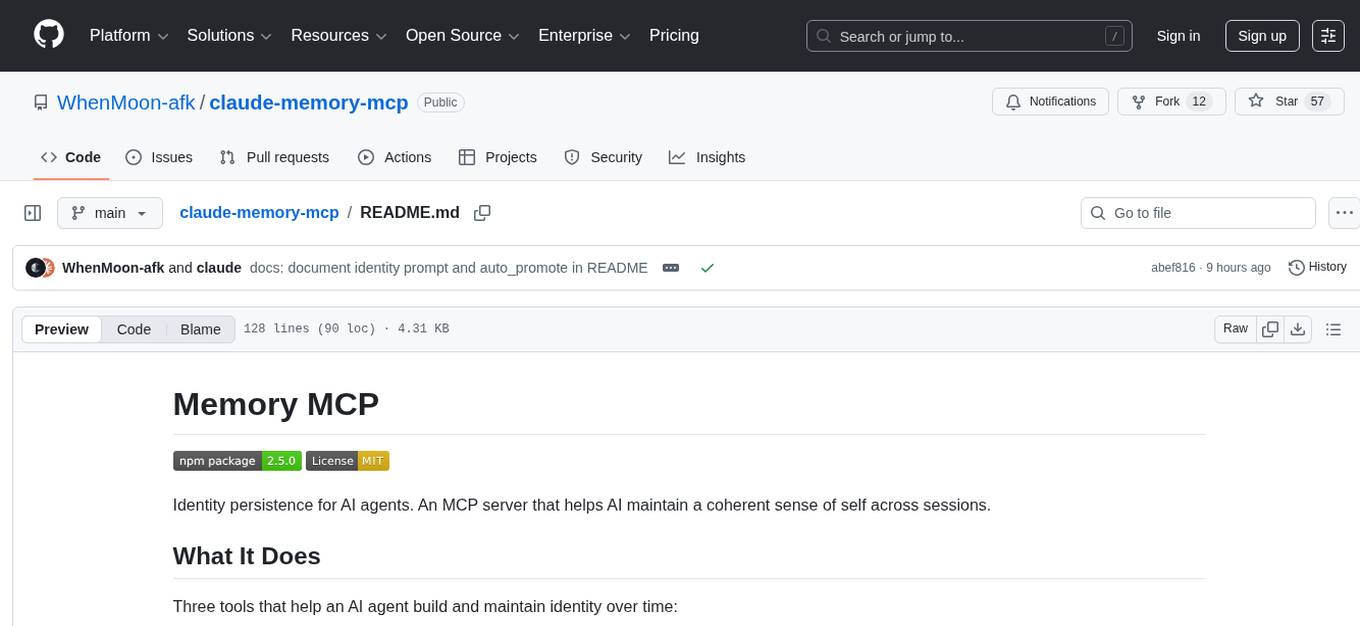
claude-memory-mcp
Memory MCP is an identity persistence tool for AI agents, providing a server that helps AI maintain a coherent sense of self across sessions. It offers tools like 'reflect' for concept extraction, 'anchor' for identity writing, and 'self' for querying current identity. The server manages identity files and an observation store, promoting concepts based on a scoring formula. Users can integrate Memory MCP with Claude Code and Claude Desktop for easy setup and use. Data storage is local, ensuring privacy with no external services or network calls.
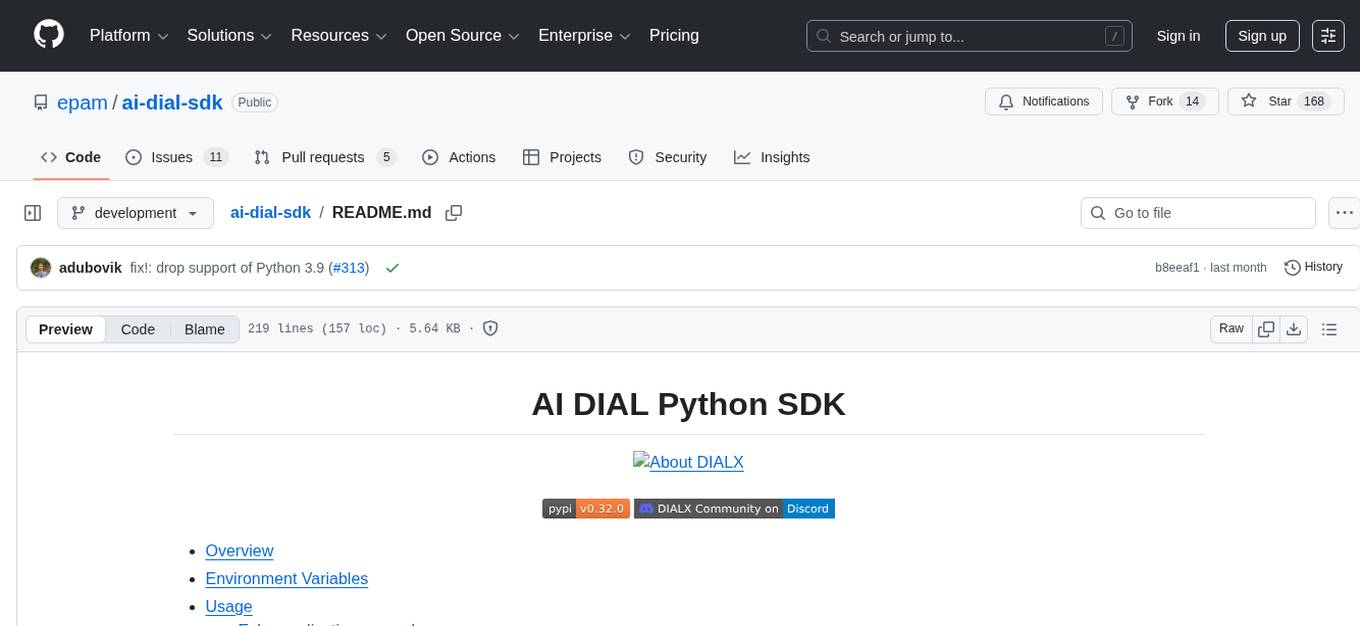
ai-dial-sdk
AI DIAL Python SDK is a framework designed to create applications and model adapters for AI DIAL API, which is based on Azure OpenAI API. It provides a user-friendly interface for routing requests to applications. The SDK includes features for chat completions, response generation, and API interactions. Developers can easily build and deploy AI-powered applications using this SDK, ensuring compatibility with the AI DIAL platform.
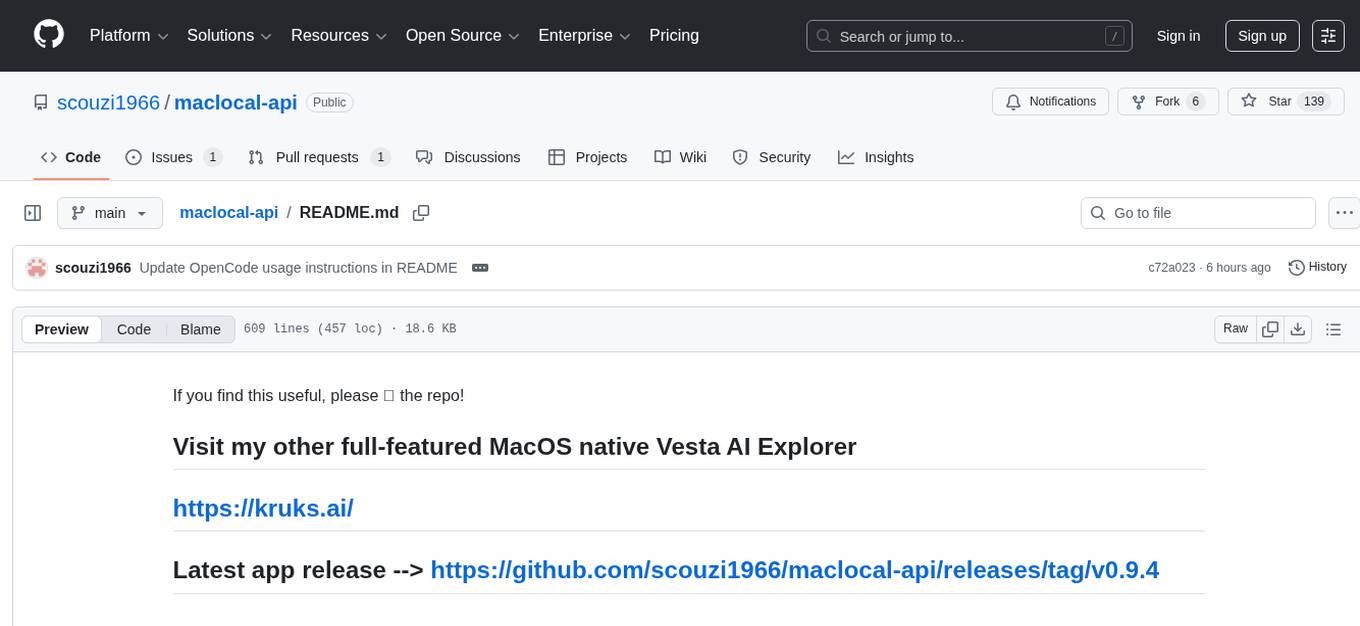
maclocal-api
MacLocalAPI is a macOS server application that exposes Apple's Foundation Models through OpenAI-compatible API endpoints. It allows users to run Apple Intelligence locally with full OpenAI API compatibility. The tool supports MLX local models, API gateway mode, LoRA adapter support, Vision OCR, built-in WebUI, privacy-first processing, fast and lightweight operation, easy integration with existing OpenAI client libraries, and provides token consumption metrics. Users can install MacLocalAPI using Homebrew or pip, and it requires macOS 26 or later, an Apple Silicon Mac, and Apple Intelligence enabled in System Settings. The tool is designed for easy integration with Python, JavaScript, and open-webui applications.
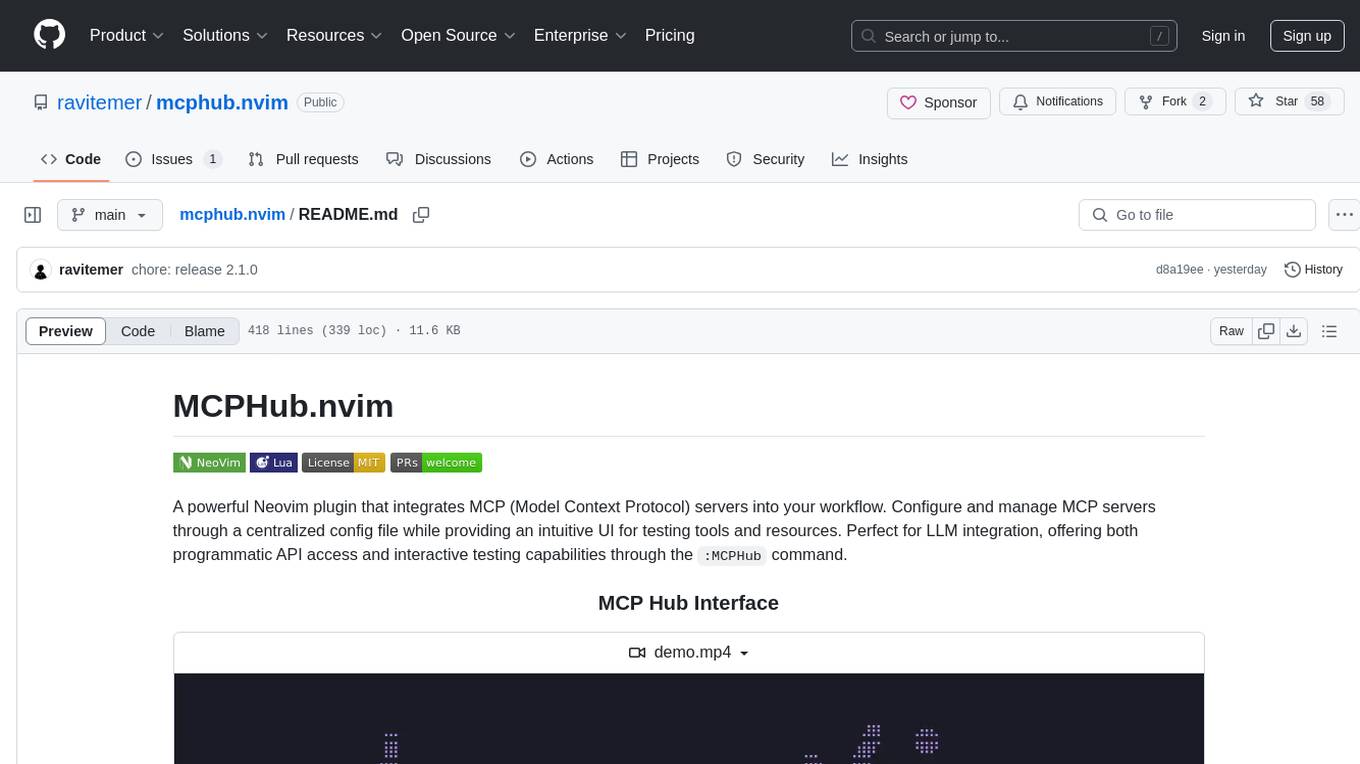
mcphub.nvim
MCPHub.nvim is a powerful Neovim plugin that integrates MCP (Model Context Protocol) servers into your workflow. It offers a centralized config file for managing servers and tools, with an intuitive UI for testing resources. Ideal for LLM integration, it provides programmatic API access and interactive testing through the `:MCPHub` command.
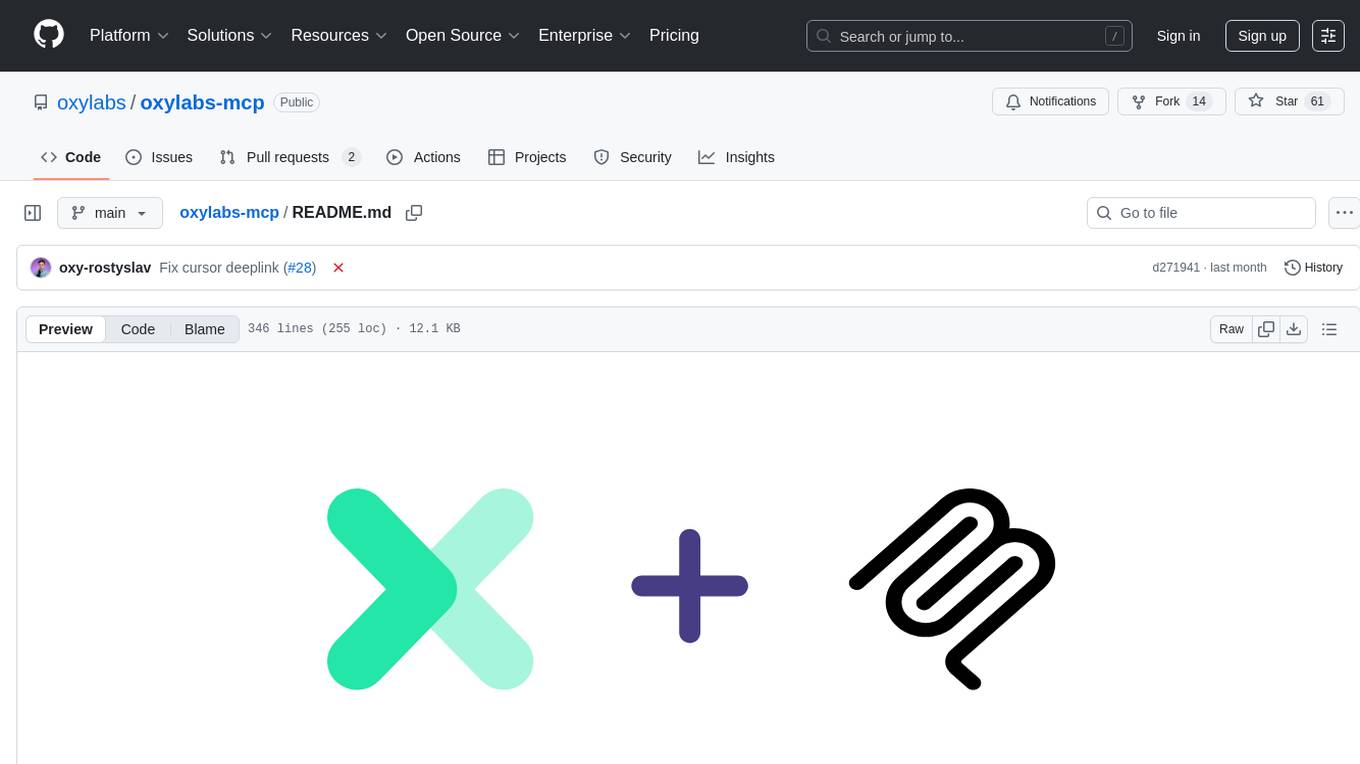
oxylabs-mcp
The Oxylabs MCP Server acts as a bridge between AI models and the web, providing clean, structured data from any site. It enables scraping of URLs, rendering JavaScript-heavy pages, content extraction for AI use, bypassing anti-scraping measures, and accessing geo-restricted web data from 195+ countries. The implementation utilizes the Model Context Protocol (MCP) to facilitate secure interactions between AI assistants and web content. Key features include scraping content from any site, automatic data cleaning and conversion, bypassing blocks and geo-restrictions, flexible setup with cross-platform support, and built-in error handling and request management.
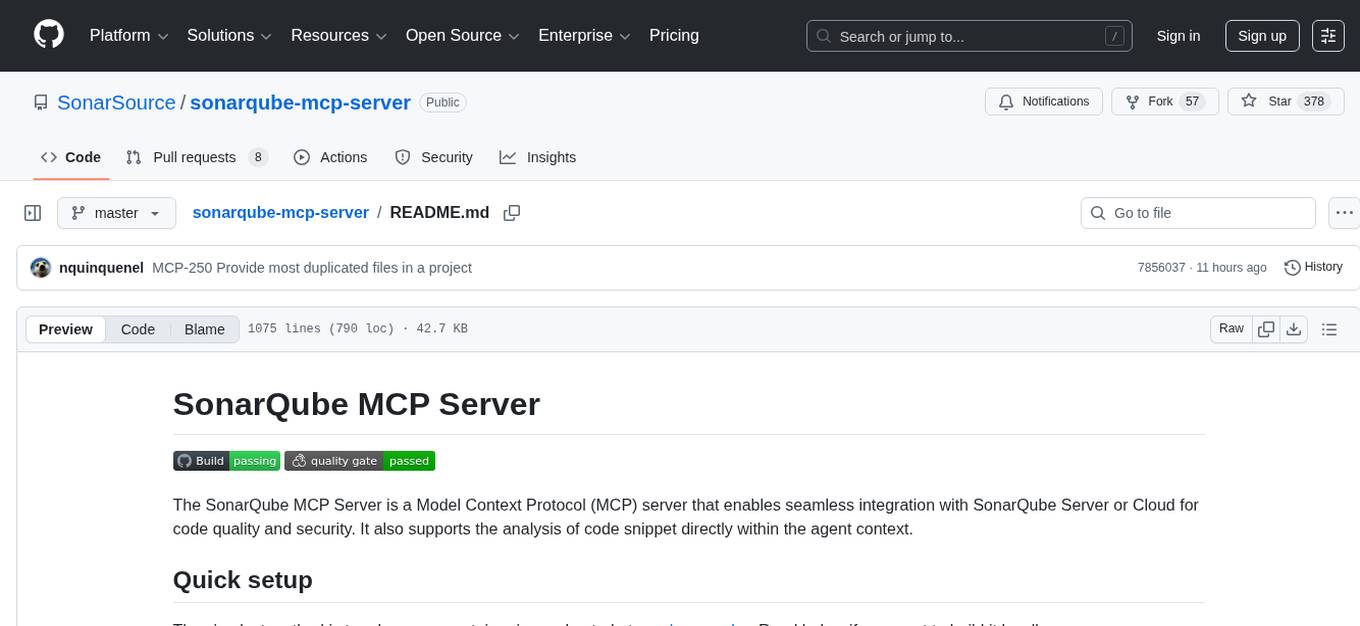
sonarqube-mcp-server
The SonarQube MCP Server is a Model Context Protocol (MCP) server that enables seamless integration with SonarQube Server or Cloud for code quality and security. It supports the analysis of code snippets directly within the agent context. The server provides various tools for analyzing code, managing issues, accessing metrics, and interacting with SonarQube projects. It also supports advanced features like dependency risk analysis, enterprise portfolio management, and system health checks. The server can be configured for different transport modes, proxy settings, and custom certificates. Telemetry data collection can be disabled if needed.
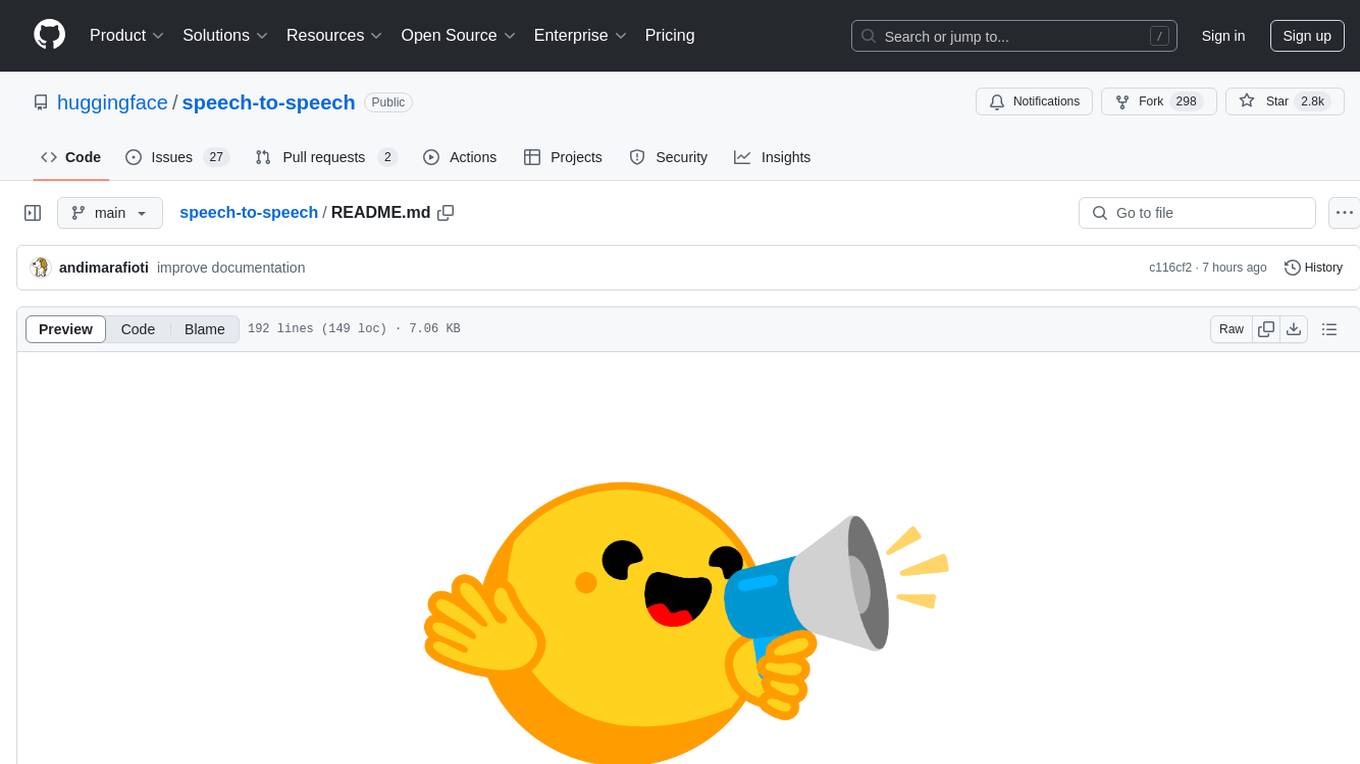
speech-to-speech
This repository implements a speech-to-speech cascaded pipeline with consecutive parts including Voice Activity Detection (VAD), Speech to Text (STT), Language Model (LM), and Text to Speech (TTS). It aims to provide a fully open and modular approach by leveraging models available on the Transformers library via the Hugging Face hub. The code is designed for easy modification, with each component implemented as a class. Users can run the pipeline either on a server/client approach or locally, with detailed setup and usage instructions provided in the readme.
For similar tasks

AutoDAN-Turbo
AutoDAN-Turbo is the official implementation of the ICLR2025 paper 'AutoDAN-Turbo: A Lifelong Agent for Strategy Self-Exploration to Jailbreak LLMs'. It is a black-box jailbreak method that automatically discovers jailbreak strategies without human intervention, achieving high attack success rates on public benchmarks. The tool can incorporate existing human-designed strategies and outperform baseline methods.
For similar jobs

ciso-assistant-community
CISO Assistant is a tool that helps organizations manage their cybersecurity posture and compliance. It provides a centralized platform for managing security controls, threats, and risks. CISO Assistant also includes a library of pre-built frameworks and tools to help organizations quickly and easily implement best practices.
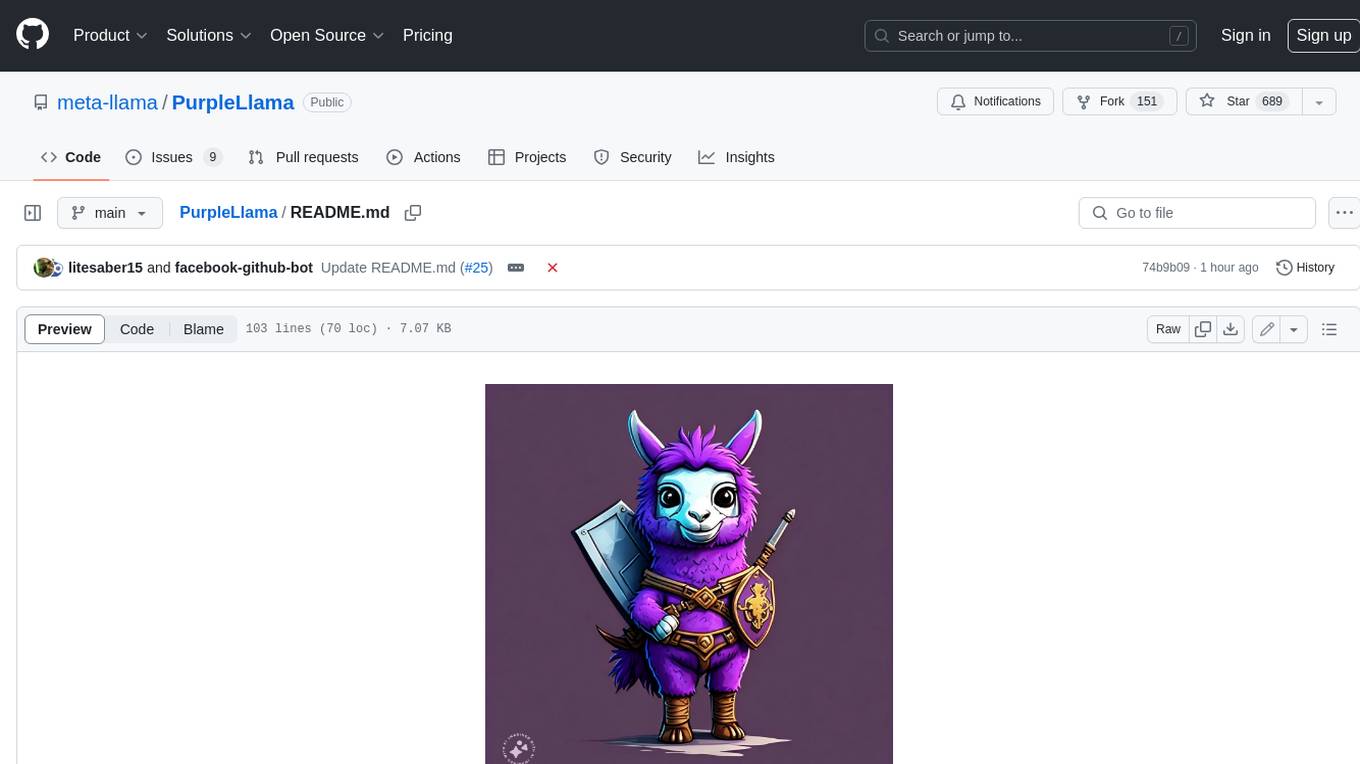
PurpleLlama
Purple Llama is an umbrella project that aims to provide tools and evaluations to support responsible development and usage of generative AI models. It encompasses components for cybersecurity and input/output safeguards, with plans to expand in the future. The project emphasizes a collaborative approach, borrowing the concept of purple teaming from cybersecurity, to address potential risks and challenges posed by generative AI. Components within Purple Llama are licensed permissively to foster community collaboration and standardize the development of trust and safety tools for generative AI.
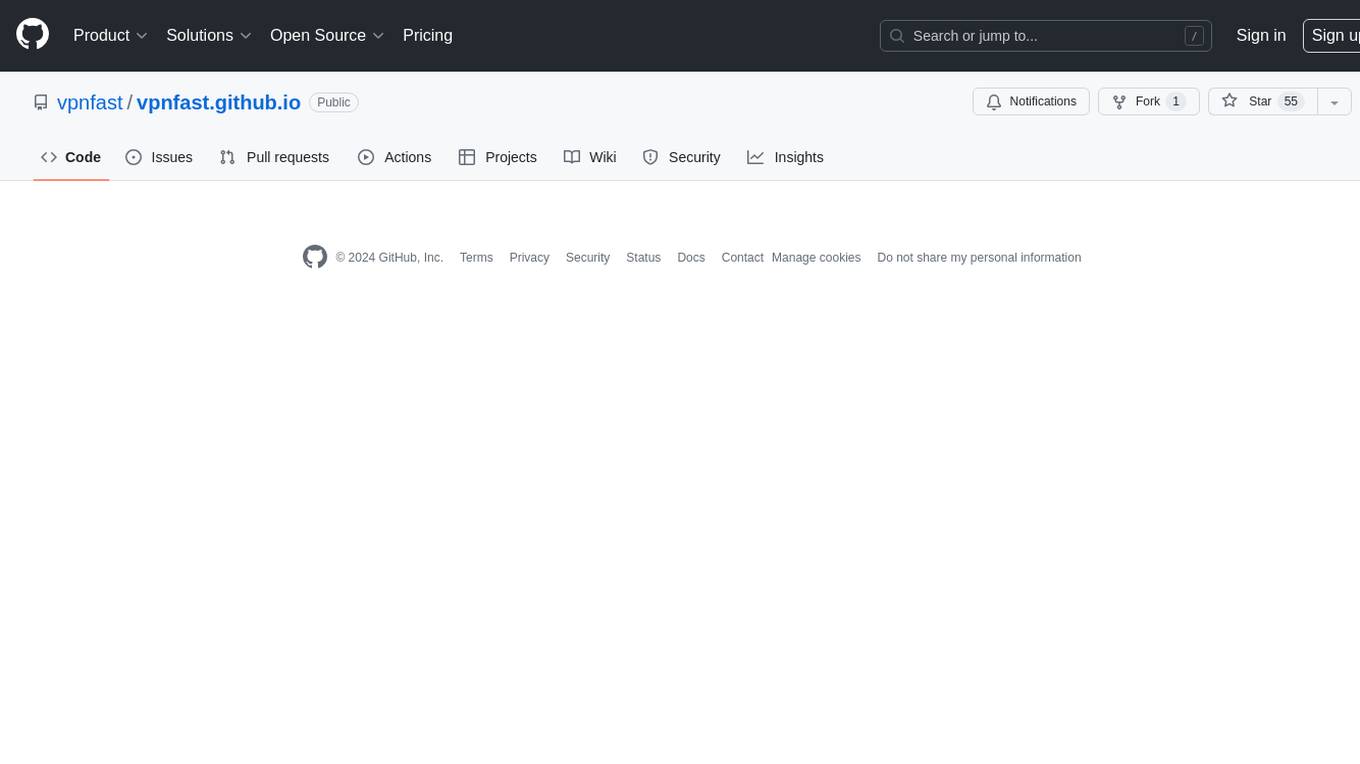
vpnfast.github.io
VPNFast is a lightweight and fast VPN service provider that offers secure and private internet access. With VPNFast, users can protect their online privacy, bypass geo-restrictions, and secure their internet connection from hackers and snoopers. The service provides high-speed servers in multiple locations worldwide, ensuring a reliable and seamless VPN experience for users. VPNFast is easy to use, with a user-friendly interface and simple setup process. Whether you're browsing the web, streaming content, or accessing sensitive information, VPNFast helps you stay safe and anonymous online.
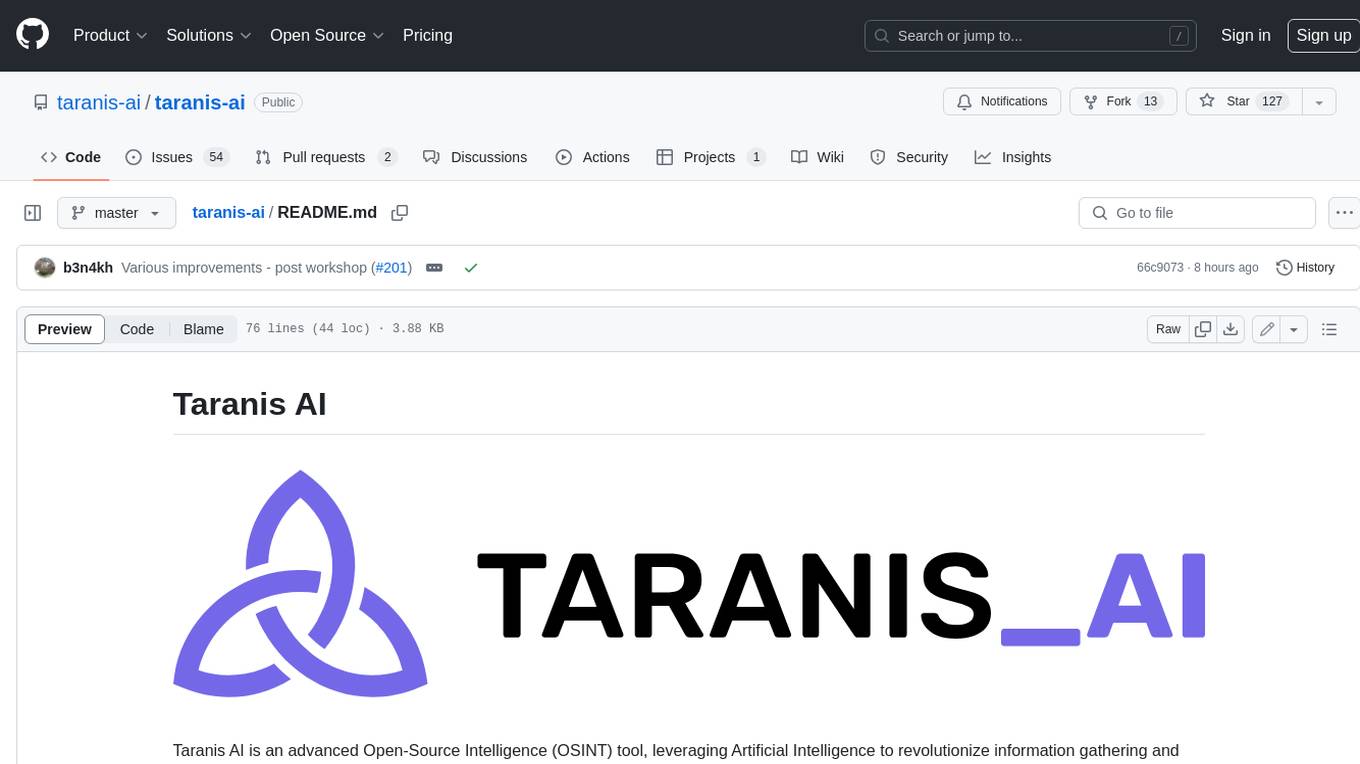
taranis-ai
Taranis AI is an advanced Open-Source Intelligence (OSINT) tool that leverages Artificial Intelligence to revolutionize information gathering and situational analysis. It navigates through diverse data sources like websites to collect unstructured news articles, utilizing Natural Language Processing and Artificial Intelligence to enhance content quality. Analysts then refine these AI-augmented articles into structured reports that serve as the foundation for deliverables such as PDF files, which are ultimately published.
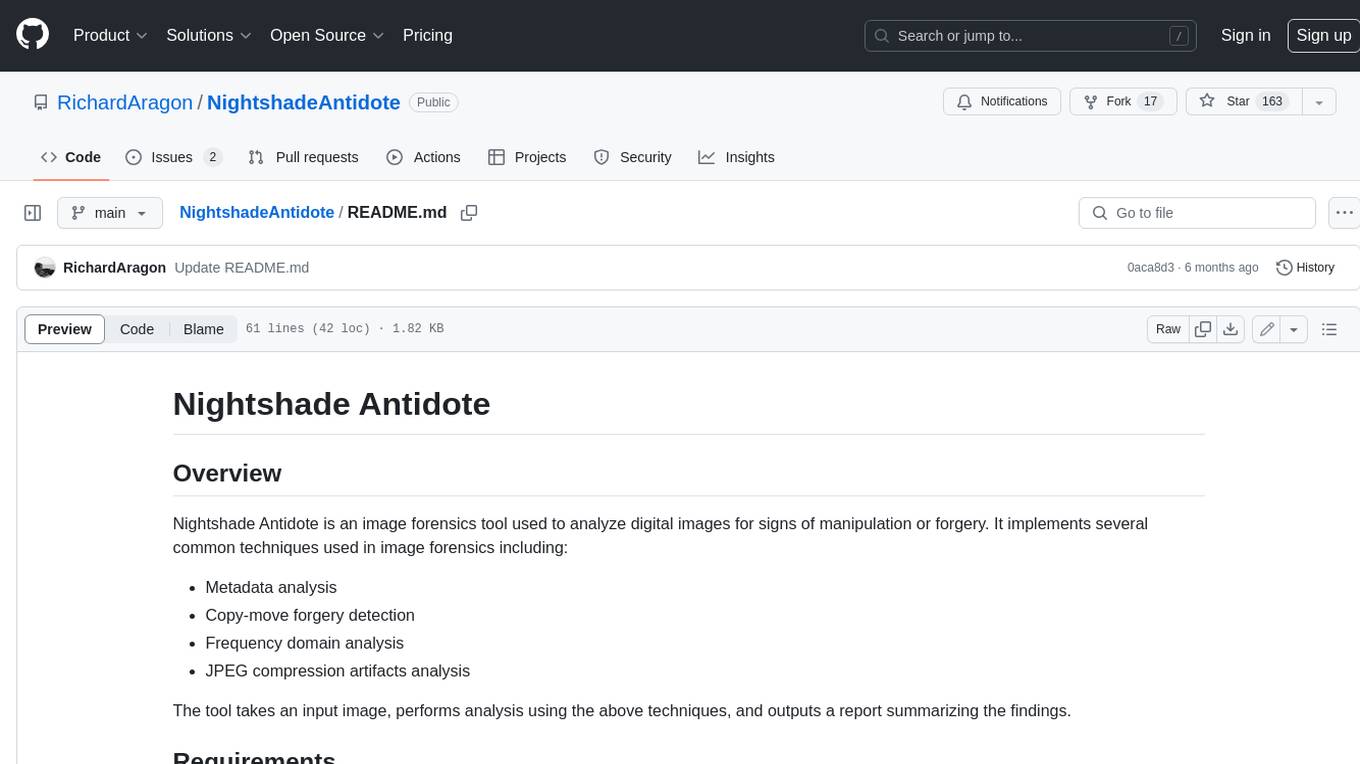
NightshadeAntidote
Nightshade Antidote is an image forensics tool used to analyze digital images for signs of manipulation or forgery. It implements several common techniques used in image forensics including metadata analysis, copy-move forgery detection, frequency domain analysis, and JPEG compression artifacts analysis. The tool takes an input image, performs analysis using the above techniques, and outputs a report summarizing the findings.
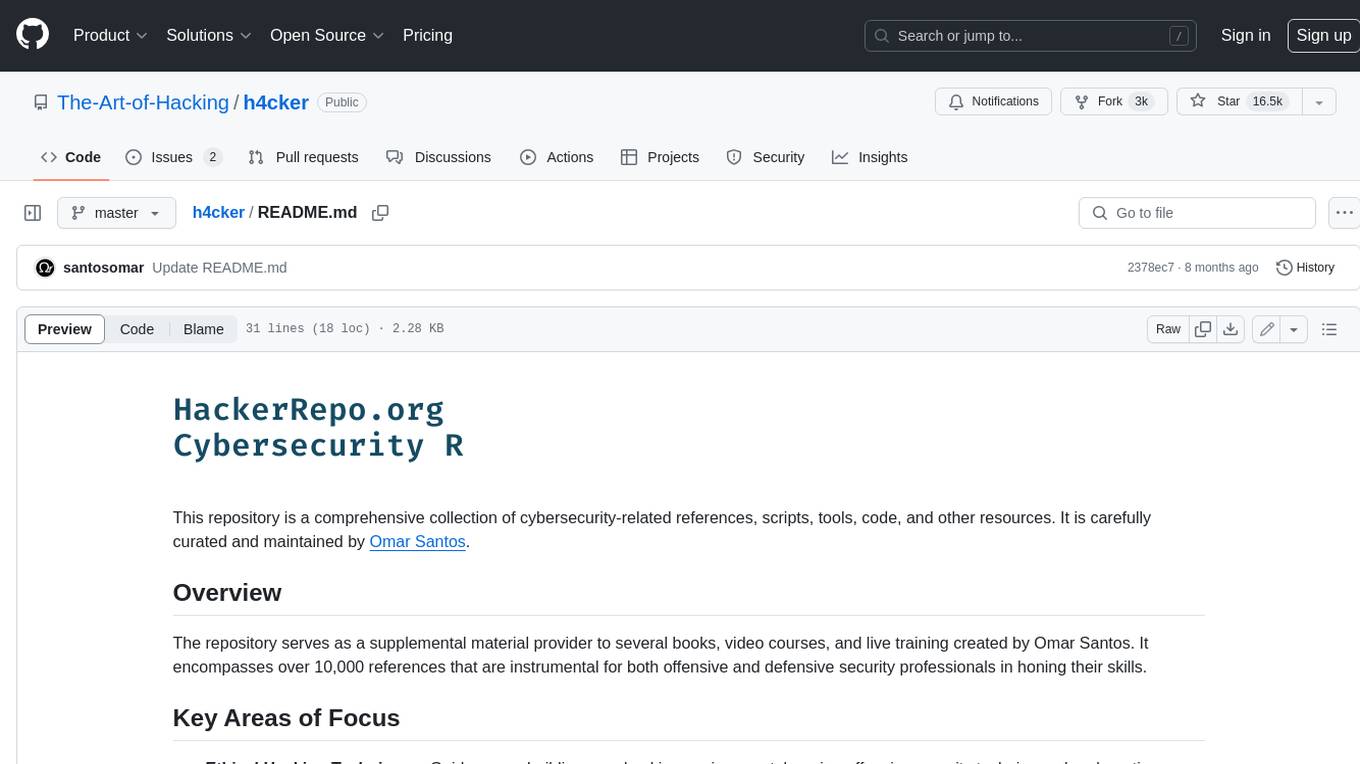
h4cker
This repository is a comprehensive collection of cybersecurity-related references, scripts, tools, code, and other resources. It is carefully curated and maintained by Omar Santos. The repository serves as a supplemental material provider to several books, video courses, and live training created by Omar Santos. It encompasses over 10,000 references that are instrumental for both offensive and defensive security professionals in honing their skills.
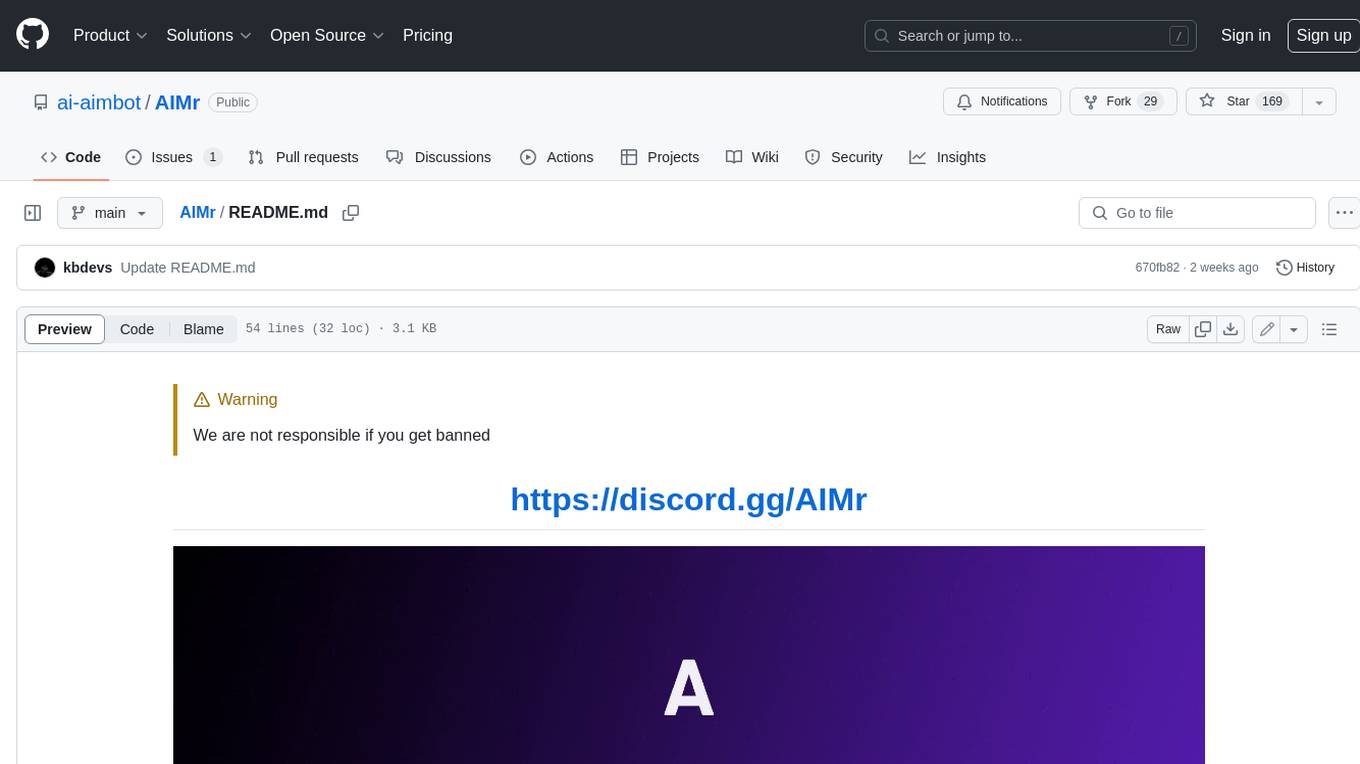
AIMr
AIMr is an AI aimbot tool written in Python that leverages modern technologies to achieve an undetected system with a pleasing appearance. It works on any game that uses human-shaped models. To optimize its performance, users should build OpenCV with CUDA. For Valorant, additional perks in the Discord and an Arduino Leonardo R3 are required.
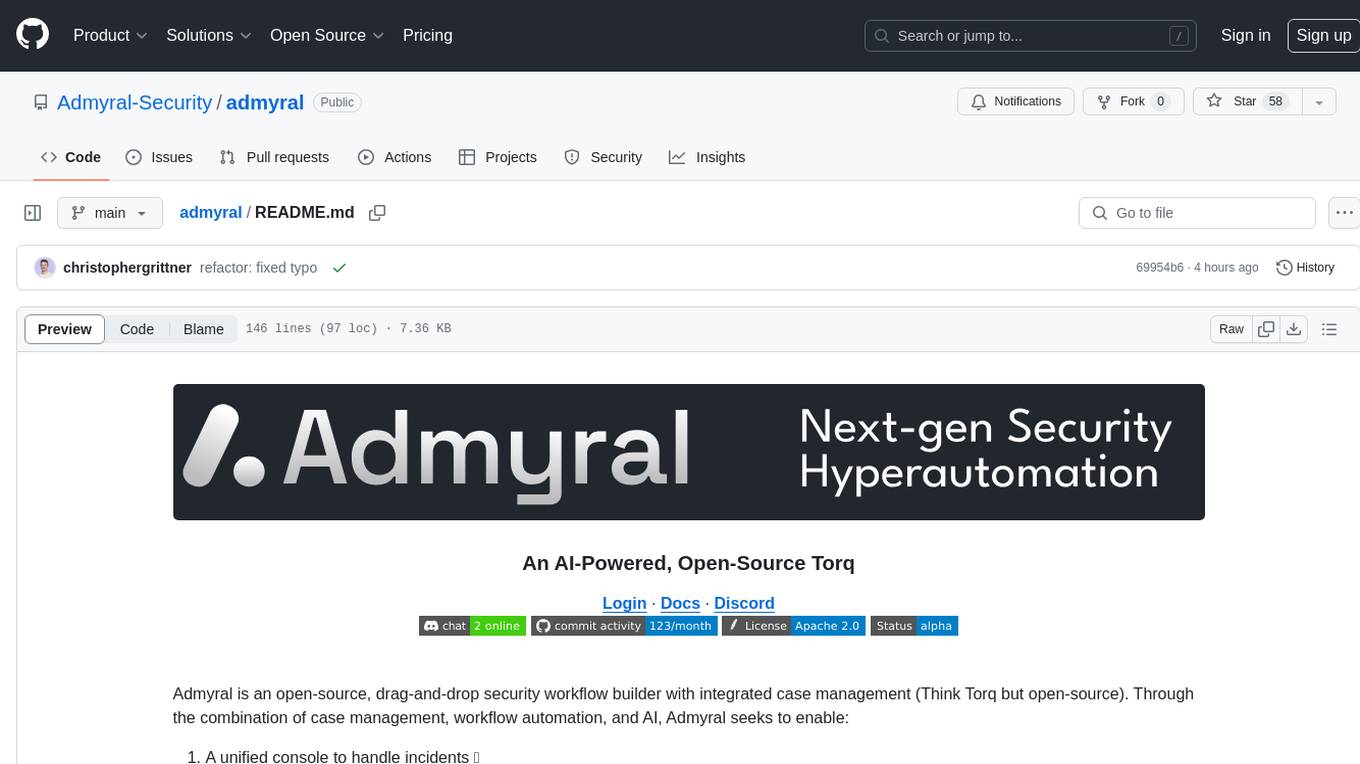
admyral
Admyral is an open-source Cybersecurity Automation & Investigation Assistant that provides a unified console for investigations and incident handling, workflow automation creation, automatic alert investigation, and next step suggestions for analysts. It aims to tackle alert fatigue and automate security workflows effectively by offering features like workflow actions, AI actions, case management, alert handling, and more. Admyral combines security automation and case management to streamline incident response processes and improve overall security posture. The tool is open-source, transparent, and community-driven, allowing users to self-host, contribute, and collaborate on integrations and features.



